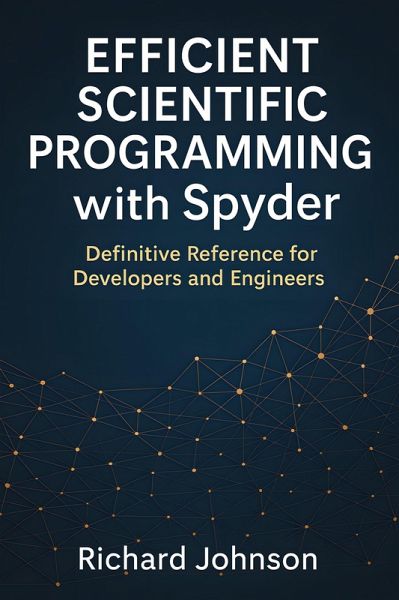
Efficient Scientific Programming with Spyder (eBook, ePUB)
Definitive Reference for Developers and Engineers

PAYBACK Punkte
0 °P sammeln!
"Efficient Scientific Programming with Spyder" "Efficient Scientific Programming with Spyder" is a definitive guide for scientists, engineers, and researchers seeking to elevate their computational workflows using the powerful Spyder IDE. This comprehensive resource delves into advanced facets of the Spyder ecosystem, including its modular architecture, extensibility through plugins, seamless integration with the scientific Python stack, and best practices for customizing and optimizing the development environment. Readers are equipped to handle large-scale, complex scientific projects, levera...
"Efficient Scientific Programming with Spyder" "Efficient Scientific Programming with Spyder" is a definitive guide for scientists, engineers, and researchers seeking to elevate their computational workflows using the powerful Spyder IDE. This comprehensive resource delves into advanced facets of the Spyder ecosystem, including its modular architecture, extensibility through plugins, seamless integration with the scientific Python stack, and best practices for customizing and optimizing the development environment. Readers are equipped to handle large-scale, complex scientific projects, leveraging environment management, high-performance computing, and distributed workflows directly from within Spyder. The book systematically covers all aspects of the scientific programming lifecycle using Python, from scripting patterns and automated refactoring to rigorous type checking, test-driven development, and collaborative code quality maintenance. Advanced chapters focus on numerical methods-such as efficient vectorization, parallelization, GPU computing, and native language integration-as well as efficient data management strategies for scientific formats, real-time acquisition, data privacy, and validation. Additionally, it explores cutting-edge scientific visualization, offering guidance on creating publication-quality plots, interactive dashboards, complex 3D visualizations, and custom analytical GUIs. Beyond technical mastery, the text addresses the real-world needs of modern scientific teams: from automating experiments and orchestrating robust data workflows, to integrating machine learning pipelines, and ensuring research reproducibility, collaboration, and open science practices. Through detailed case studies and explorations of future trends-including cloud, HPC, and community-driven development-this book empowers scientists to build, extend, and manage end-to-end, scalable, and reproducible research solutions with Spyder at the core of their computational toolset.
Dieser Download kann aus rechtlichen Gründen nur mit Rechnungsadresse in A, B, BG, CY, CZ, D, DK, EW, E, FIN, F, GR, H, IRL, I, LT, L, LR, M, NL, PL, P, R, S, SLO, SK ausgeliefert werden.













